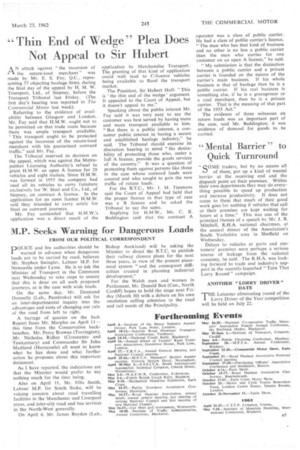Thin End of Wedge" Plea Does Not Appeal to Sir IIubert
Page 39

If you've noticed an error in this article please click here to report it so we can fix it.
AN attack against 'the incursion of the return-load merchant" was made by Mr. E. S. Fay, Q.C., representing 57 objecting haulage firms, during the final day of the appeal by H. M. W. Transport, Ltd., of Stepney, before the Transport Tribunal last Friday. (The first day's hearing was reported in The Commercial Motor last week).
Referring to the evidence of availability between Glasgow and London. Mr. Fay said that H.M.W. ought not to be permitted on that trade route because there was ample transport available. " This transport ought to be protected against the incursion of the return-load merchant with his guaranteed outward traffic," said Mr. Fay.
The Tribunal reserved its decision on the appeal, which was against the Metropolitan Licensing Authority's refusal to grant H.M.W. an open A licence for 28 vehicles and eight trailers. Since H.M.W. was formed in 1955 the company had used all its vehicles to carry furniture exclusively for W. Steel and Co., Ltd., of Stepney, on contract A licence. In the application for an open licence H.M.W. said they intended to carry solely for Steel on outward journeys.
Mr. Fay contended that H.M.W.'s application was a direct result of the application by Merchandise Transport. The granting of that kind of application could well lead to C-licence vehicles being available to flood the transport market.
The President. Sir Hubert Hull: "This is 'the thin end of the wedge' argument. It appealed to the Court of Appeal, but it doesn't appeal to me."
Speaking about the public interest Mr. Fay said it was very easy to say the customer was best served by having more and more transport available to him. " But there is a public interest, a consumer public interest in having a secure and established haulage industry," he said. The Tribunal should exercise its discretion bearing in mind "the desirability of protecting those who, under a full A licence, provide the goods services of the country." It was a question of protecting them against persons like those in the case whose outward loads were assured and who sought to gain the new traffic of return loads.
For the B.T.C., Mr. J. M. Timmons said the Court of Appeal had held that the proper licence in that type of case was a B licence and he asked the Tribunal to say the same.
Replying for H.M.W., Mr. C. R. Beddington said that the contract A operator was a class of public carrier. He had a class of public carrier's licence. "The man who has that kind of business and no other is no less a public carrier than the man who carries for one customer on an open A licence," he said.
" My submission is that the distinction between a public carrier and a private carrier is founded on the nature of the carrier's main business. If his whole business is that of haulage then he is a public carrier. If his real business is something else, if he is a greengrocer or a coal merchant, then he is a private carrier. That is the meaning of that part of the 1933 Act."
The evidence of three witnesses on return loads was an important part of the case, said Mr. Beddington; it was evidence of demand for goods to be carried.




















































































































